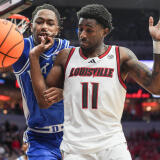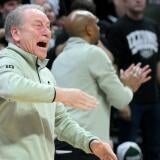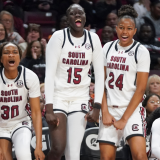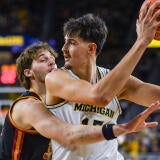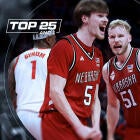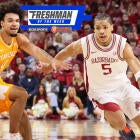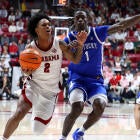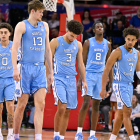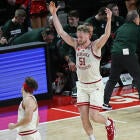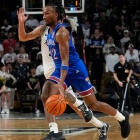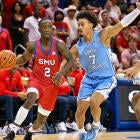Critical Coaches: Who is perceived to be the biggest cheater in the sport?
Where fact trumps fiction, where a rumor ends and the truth begins, is sometimes hard to determine. But perception is usually treated as reality regardless -- even if the overwhelming majority of coaches are never actually charged with violating major recruiting rules.
 |
| John Calipari and Scott Drew aren't perceived in a great light by some of their peers. (US Presswire) |
CBSSports.com's college basketball quartet of Gary Parrish, Jeff Goodman, Jeff Borzello and Matt Norlander spent the July recruiting period hobnobbing with nearly 100 coaches, brain-picking them on some of the sport's current issues. From the best players to their comrades in coaching; from the AAU programs to the agents' involvement; from the rule changes to the NCAA as a whole. We had to promise them anonymity, and in exchange, they gave us honest answers. Over the next three weeks here on the blog, we'll be putting out one question per weekday and giving you the array of results, straight from the coaches' mouths.
College basketball is widely regarded as the sketchiest sport with the sketchiest characters thanks to men like Myron Piggie, Ken Caldwell and all the coaches who have historically dealt with them and people like them. Where fact trumps fiction, where a rumor ends and the truth begins, is sometimes hard to determine. But perception is usually treated as reality regardless -- even if the overwhelming majority of coaches are never actually charged with violating major recruiting rules.
Still, coaches know other coaches and how they operate.
Or at least they think they do.
Which leads us to our next question.
The question: Who is perceived by college coaches to be the biggest cheater in the sport?
- John Calipari (Kentucky): 36 percent
- Scott Drew (Baylor): 34 percent
- Ben Howland (UCLA): 12 percent
- Jim Calhoun (Connecticut): 7 percent
- Tom Crean (Indiana): 3 percent
- Dave Rice (UNLV): 3 percent
Others receiving votes: Too many to list.
Quotes that stuck:
On John Calipari: "Cal probably doesn't have to cheat now as much as he used to, but he's still the standard. The rest of us can't even deal in his league. He's the best."
| More Critical Coaches |
| Questions |
On Scott Drew: "I don't even have to blink when I say the answer. He's despised by a lot of people because he comes off holier than God. Meanwhile, everyone knows he's had to cheat big-time to get the program to where it's at. If it wasn't for the God stuff he wouldn't rub people the wrong way as much."
On Ben Howland: "I've had many conversations with other coaches about [what's believed to be going on at UCLA]. And this is from me, someone not even recruiting the West Coast."
On Jim Calhoun: "You ever been to Storrs? It's miserable. But Calhoun, somehow, has recruited pros there for decades. Hell, he's one of the guys who actually got caught cheating [with Nate Miles]. He's the obvious answer."
On Dave Rice: "They've gotta be doing something at UNLV."
On high-major coaches in general: "They all [expletive] cheat. Every high-level coach cheats."
Takeaway (by Gary Parrish):
Let me start by making one thing clear -- that we at CBSSports.com are not calling anybody a cheater. We worded the question carefully and specifically for a reason, because it's unfair to call anybody a cheater without proof. So please don't tell your friends that "CBSSports.com called John Calipari and Scott Drew cheaters," because we've actually done nothing of the sort.
What we did is ask a bunch of coaches to tell us who they "perceive" as the sport's biggest cheater.
Regardless of whether it's real or not, we wanted to know what coaches think.
What you see above represents what they told us.
Take it for what it's worth.
Or, if you're Calipari or Drew, take offense -- though after many conversations over the years with both men I don't think either will be surprised to see their names at the top even if they'll almost certainly find it frustrating. Calipari swears he does things the right way; Drew does, too. And it should be noted that neither has ever been charged with a major recruiting violation despite the fact that both men's programs have been, at one time or another, thoroughly investigated by the NCAA.
Still, coaches roll their eyes at Calipari and Drew.
They just do.
Calipari's connection to William Wesley -- AKA, World Wide Wes -- has long been considered a questionable advantage regardless of whether Wes' status in the sport is legitimate or overblown, and a significant number of coaches believe Nike helps Calipari, too. Basically, folks just don't believe anybody could get the likes of Derrick Rose and Tyreke Evans to Memphis -- or DeMarcus Cousins, Marquis Teague and Anthony Davis to Kentucky -- without some sort of assistance from somewhere.
Is that fair?
Maybe not.
But that's what coaches think.
And Drew's situation at Baylor is similar.
Almost nobody has a specific story but nearly everybody believes "he's gotta be doing something" to convince consensus top-10 prospects like Perry Jones, Quincy Miller and Isaiah Austin to move to Waco. You know how that female athlete from China swam incredible times at the Olympics and was immediately cast as a possible cheater for no other reason than that people simply didn't believe what she did could be done legitimately? That's basically the case with Drew. No coach seems to know exactly what he's supposedly doing or exactly how he's supposedly doing it. But they still think he must be doing something. That's why he got 34 percent of the vote.
Howland's inclusion is obviously a result of his recent recruiting class.
Calhoun's program has been caught cheating.
Crean and Rice have made historically strong programs strong again.
It's difficult to say whether these men's appearances in our poll is a result of cheating or of them achieving things in recruiting others simply do not believe they ought to be achieving. Either way, jealously and petty differences likely play a role, and it's probably important to remember that, too. What's also important to remember is that this poll is in no way, shape or form an indictment of anybody, and that nobody is getting a postseason ban. This poll is merely a reflection of the mostly unsubstantiated opinions of a bunch of men who should know college basketball better than anybody else knows college basketball. So, like I wrote before, take it for what it's worth, for what it is.

